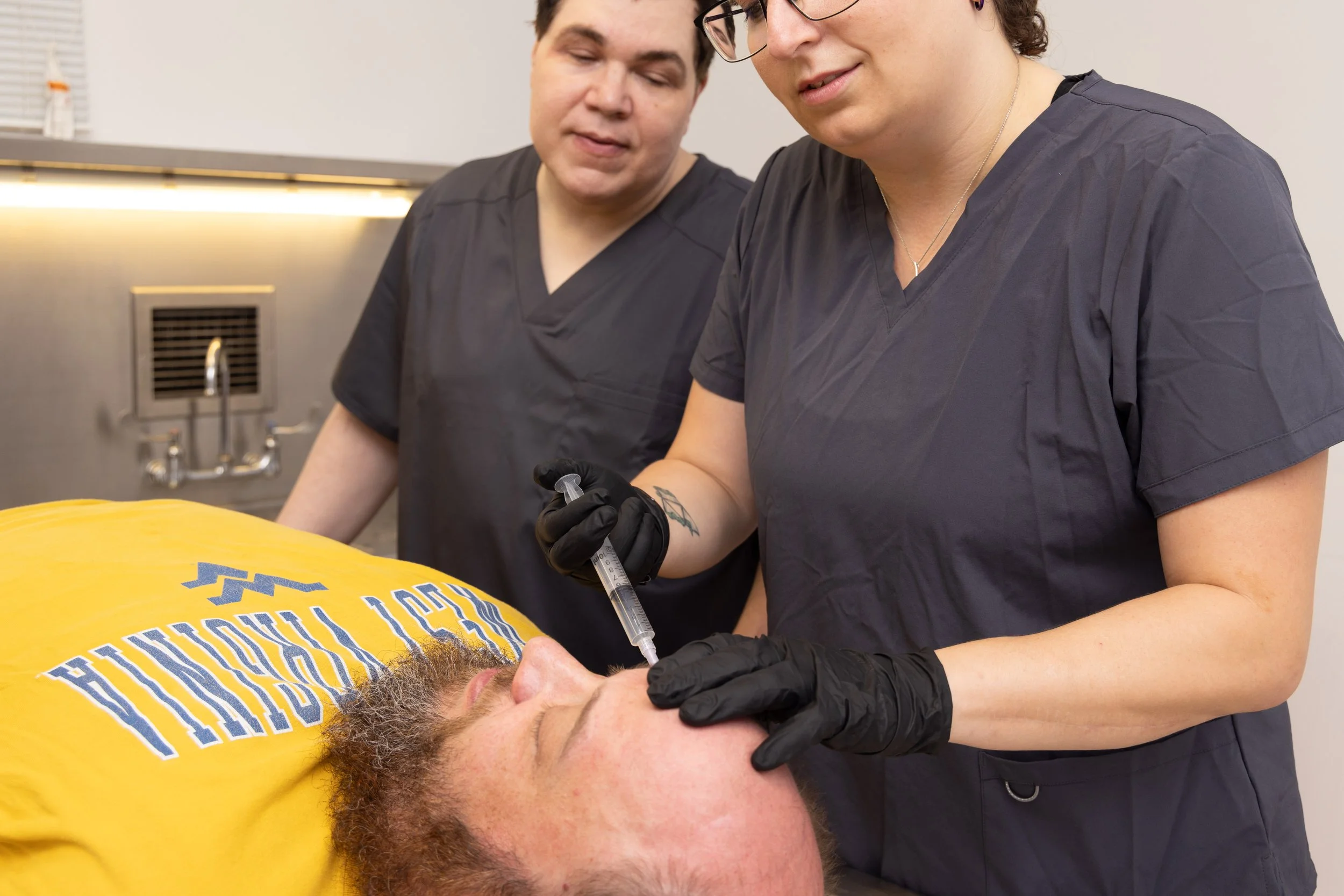
Frequently asked questions.
What is an autopsy?
An autopsy is a medical procedure conducted by a pathologist to thoroughly examine the body of a person who has died. This examination aims to identify underlying medical conditions and/or injuries to determine or clarify the cause of death.
What occurs during an autopsy?
A standard autopsy includes two main parts: an external examination and an internal examination. The external examination looks at the outside of the body and documents things like height and weight, eye color and hair color, and any evidence of a disease process or injury. The internal examination involves surgical incisions to thoroughly assess each of the organs, tissues, and body cavities. A standard internal exam is inclusive of the head, chest, abdomen, and neck. An in-depth examination of the extremities and other tissues is conducted based on each specific case.
Are there different types of autopsies?
Yes, there are different types of autopsies, each with a different focus.
· Forensic autopsy: Ordered by legal authorities for cases involving trauma, violence, or suspicious circumstances; focuses on evidence collection.
· Hospital autopsy: Performed with family consent after a natural death to clarify medical diagnoses or disease progression.
· Private autopsy: Conducted after a natural death or once a person who has died is released from the Medical Examiner or Coroner’s jurisdiction
Why do families choose to have a private autopsy performed?
Families may choose to have a private autopsy performed for multiple reasons. Often, they seek answers to unresolved questions about the cause of death or require specific information regarding a medical condition that may not have been fully explored. A private autopsy provides the opportunity for an independent examination conducted by a qualified pathologist, offering a thorough and unbiased assessment. In some instances, families may pursue this option based on recommendations from their attorney, especially if legal considerations are involved. Private autopsies may also be requested if the Medical Examiner or Coroner has not performed one, or if the family seeks a more detailed or independent analysis.
Who can request a private autopsy?
Private autopsies can only be requested by the legal next of kin. Authorization from the next of kin is mandatory and must include a signature on the official JHP authorization form. Legal next of kin are recognized in the following general order (though may vary based on jurisdiction): spouse, adult child or children, parents, and siblings. In situations where there are multiple parties of the same legal authority (multiple parents, siblings, children, etc.), all parties must provide written consent confirming their agreement to authorize our services. An attorney or funeral home may assist with arrangements, but formal authorization must come from the legal next of kin.
Can a private autopsy still be performed if my loved one is already embalmed?
Yes. A private autopsy can still be performed if your loved one is already embalmed. The embalming process may limit the interpretation of certain substances in toxicology testing. Embalming typically does not completely obscure signs of injury or disease processes, but the interpretation may be limited. Your JHP team member will help you understand if your questions can likely be answered prior to scheduling the autopsy. If you are considering a private autopsy, it is best to delay embalming until after the procedure.
What does the pathologist need to know to perform a private autopsy?
A private autopsy will yield the most information when historical medical, social, and family information is shared with the pathologist. Our JHP team members are trained to gather information about your loved one’s medical history, including surgeries, diagnoses, and prescribed medications. You will also be asked to discuss the circumstances surrounding the death of your loved one and what information you hope to learn from the autopsy. This allows the JHP team to assess the best approach and ensure those areas are thoroughly evaluated during the course of the autopsy.
Will a cause of death be determined?
No, a cause of death will not be determined or specifically stated in the autopsy report for a private autopsy. While a private autopsy often yields valuable medical information that lends insight to the cause of death, it is important to understand that determining a definitive cause of death is not going to be provided within the scope of the private autopsy. The cause of death listed on the death certificate is determined by the treating provider, Medical Examiner, or Coroner, who may have access to additional investigative resources not available during a private autopsy. In some cases, an obvious cause of death may be apparent during the autopsy; however, this is not assured. The pathologist’s role in a private autopsy is to provide a comprehensive and unbiased medical evaluation, which contributes to a larger understanding rather than offering absolute conclusions based only on the autopsy.
How can the results of a private autopsy be used?
Autopsy findings, together with medical records, lab tests, and other evidence, can help inform opinions about the cause of death.
Who will sign the death certificate?
JHP does not complete or certify death certificates. This responsibility is fulfilled by the medical providers who were attending to your loved one at the time of their death, or by the Medical Examiner or Coroner, depending on the circumstances surrounding the death.
What is the cost of a private autopsy?
Fees are based on the specific needs of each case and the services requested. The base autopsy fee is $4,250.00, which covers the standard autopsy procedures. Additional costs apply for specialized testing and examinations, which may be requested and authorized by the next of kin depending on the complexity and requirements of the case.
What special tests are available and how do I know what type of tests to request?
Specialized testing may include histology and specialized stains to assess tissue samples, neuropathological evaluations to explore brain and nerve conditions, radiology to check for fractures, and toxicology to detect the presence of substances or toxins. Other specialized testing can be performed as appropriate. The specifics of these tests are best discussed with one of your dedicated JHP team members, who can offer tailored recommendations and options to address your unique needs.
Where will the private autopsy be performed?
The private autopsy will be performed at one of our two autopsy locations in Greensburg, PA or Indiana, PA. Both facilities are fully equipped to ensure a thorough examination in a professional and respectful environment.
How long does a private autopsy take?
The physical examination part of a private autopsy is typically completed within one day. Specimens such as tissue samples are collected during the autopsy process to streamline further analysis if specialized testing is necessary. If there are time constraints or special considerations, please discuss them with your JHP team member so we can accommodate your needs.
Will the private autopsy delay the funeral or impact our ability to have a viewing at the funeral home?
A private autopsy is generally performed in a manner that does not delay funeral arrangements or prevent a viewing at the funeral home. Our team collaborates closely with your chosen funeral home to ensure all timelines and requirements are met, maintaining dignity and respect for your loved one throughout the process.
Do you offer transportation to and from your facilities?
While JHP does not provide transportation directly, we coordinate with funeral homes and transportation services to ensure efficient arrangements. Your funeral home may offer transportation by their own staff. Alternatively, a transportation service can be utilized. We will work with you and the funeral home to arrange transportation that is the most suitable for your situation.
When can I expect the results of the private autopsy?
We will work to complete the report as soon as possible, as we understand that waiting for information can be a difficult and anxious experience. Your dedicated JHP team member will provide a courtesy phone call following the examination to provide any preliminary findings from the autopsy and to answer specific questions about next steps.
Additionally, at the conclusion of the private autopsy, an autopsy report will be generated. The finalized autopsy report typically takes 2 to 4 months to complete. Occasionally, the length of time can vary due to the current turnaround time for JHP and laboratories performing specialized testing or examinations.
Will I receive a copy of the autopsy report?
Yes, the legal next of kin can request a copy of the autopsy report and reports from any testing at no additional charge. The reports can be sent via email, postal mail, or copied onto a thumb drive, depending on your preference. With authorization, a copy of the report can be shared with your attorney.
If the Medical Examiner or Coroner’s office is involved, can you share the autopsy findings with them?
Yes, the results of the autopsy and/or a copy of the autopsy report can be shared with the Medical Examiner or Coroner’s office with your written consent. You are not obligated to authorize release of the autopsy report to any party other than yourself. We will not release a copy of the autopsy report or any specialized testing to an unauthorized party unless required by law.
I am interested in a private autopsy. What happens next?
If you are interested in a private autopsy, you will need to select a funeral home to handle the arrangements for your loved one and discuss your desire for a private autopsy with the funeral home representative. After finalizing arrangements with the funeral home, you or the funeral home may contact our office to speak with a JHP team member. They will gather all the necessary information and discuss the examination and testing options that are available and relevant. You will then complete an authorization form and provide payment (cash, check, or online payment via QuickBooks). Once the authorization form and payment are received, we will begin coordinating the logistics of the private autopsy.
